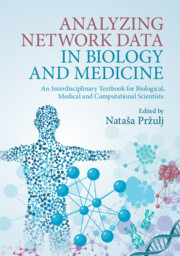Refine listing
Actions for selected content:
1413 results in Ebooks in network science
Index
-
- Book:
- Analyzing Network Data in Biology and Medicine
- Published online:
- 18 March 2019
- Print publication:
- 28 March 2019, pp 621-632
-
- Chapter
- Export citation
5 - Graphlets in Network Science and Computational Biology
-
- Book:
- Analyzing Network Data in Biology and Medicine
- Published online:
- 18 March 2019
- Print publication:
- 28 March 2019, pp 193-240
-
- Chapter
- Export citation
13 - Cytoscape: A Tool for Analyzing and Visualizing Network Data
-
- Book:
- Analyzing Network Data in Biology and Medicine
- Published online:
- 18 March 2019
- Print publication:
- 28 March 2019, pp 533-592
-
- Chapter
- Export citation
14 - Analysis of the Signatures of Cancer Stem Cells in Malignant Tumors Using Protein Interactomes and the STRING Database
-
- Book:
- Analyzing Network Data in Biology and Medicine
- Published online:
- 18 March 2019
- Print publication:
- 28 March 2019, pp 593-620
-
- Chapter
- Export citation
8 - Machine Learning for Biomarker Discovery: Significant Pattern Mining
-
- Book:
- Analyzing Network Data in Biology and Medicine
- Published online:
- 18 March 2019
- Print publication:
- 28 March 2019, pp 313-368
-
- Chapter
- Export citation
12 - Network Neuroscience
-
- Book:
- Analyzing Network Data in Biology and Medicine
- Published online:
- 18 March 2019
- Print publication:
- 28 March 2019, pp 490-532
-
- Chapter
- Export citation
Preface
-
- Book:
- Analyzing Network Data in Biology and Medicine
- Published online:
- 18 March 2019
- Print publication:
- 28 March 2019, pp xiii-xiv
-
- Chapter
- Export citation
1 - From Genetic Data to Medicine: From DNA Samples to Disease Risk Prediction in Personalized Genetic Tests
-
- Book:
- Analyzing Network Data in Biology and Medicine
- Published online:
- 18 March 2019
- Print publication:
- 28 March 2019, pp 1-62
-
- Chapter
- Export citation
2 - Epigenetic Data and Disease
-
- Book:
- Analyzing Network Data in Biology and Medicine
- Published online:
- 18 March 2019
- Print publication:
- 28 March 2019, pp 63-110
-
- Chapter
- Export citation
Dedication
-
- Book:
- Analyzing Network Data in Biology and Medicine
- Published online:
- 18 March 2019
- Print publication:
- 28 March 2019, pp v-vi
-
- Chapter
- Export citation
10 - Network Medicine
-
- Book:
- Analyzing Network Data in Biology and Medicine
- Published online:
- 18 March 2019
- Print publication:
- 28 March 2019, pp 414-458
-
- Chapter
- Export citation
3 - Introduction to Graph and Network Theory
-
- Book:
- Analyzing Network Data in Biology and Medicine
- Published online:
- 18 March 2019
- Print publication:
- 28 March 2019, pp 111-150
-
- Chapter
- Export citation
4 - Protein–Protein Interaction Data, their Quality, and Major Public Databases
-
- Book:
- Analyzing Network Data in Biology and Medicine
- Published online:
- 18 March 2019
- Print publication:
- 28 March 2019, pp 151-192
-
- Chapter
- Export citation
List of Contributors
-
- Book:
- Analyzing Network Data in Biology and Medicine
- Published online:
- 18 March 2019
- Print publication:
- 28 March 2019, pp ix-xii
-
- Chapter
- Export citation
9 - Network Alignment
-
- Book:
- Analyzing Network Data in Biology and Medicine
- Published online:
- 18 March 2019
- Print publication:
- 28 March 2019, pp 369-413
-
- Chapter
- Export citation
11 - Elucidating Genotype-to-Phenotype Relationships via Analyses of Human Tissue Interactomes
-
- Book:
- Analyzing Network Data in Biology and Medicine
- Published online:
- 18 March 2019
- Print publication:
- 28 March 2019, pp 459-489
-
- Chapter
- Export citation
Contents
-
- Book:
- Analyzing Network Data in Biology and Medicine
- Published online:
- 18 March 2019
- Print publication:
- 28 March 2019, pp vii-viii
-
- Chapter
- Export citation

Analyzing Network Data in Biology and Medicine
- An Interdisciplinary Textbook for Biological, Medical and Computational Scientists
-
- Published online:
- 18 March 2019
- Print publication:
- 28 March 2019
Acknowledgements
-
- Book:
- Networks in Climate
- Published online:
- 15 February 2019
- Print publication:
- 28 February 2019, pp ix-x
-
- Chapter
- Export citation
Frontmatter
-
- Book:
- Networks in Climate
- Published online:
- 15 February 2019
- Print publication:
- 28 February 2019, pp i-iv
-
- Chapter
- Export citation
